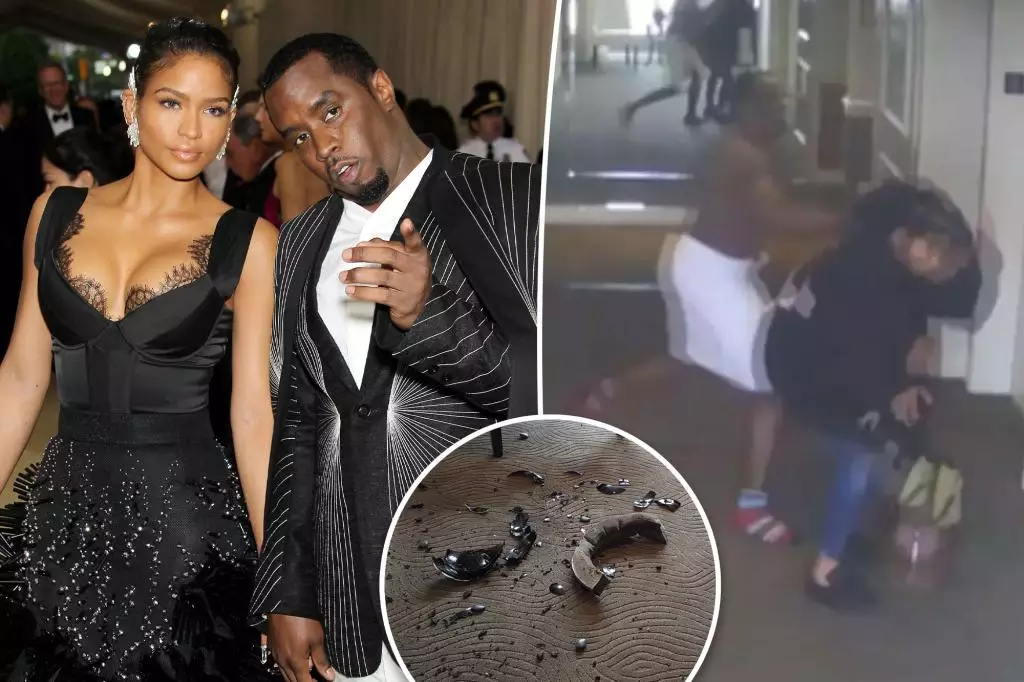The courtroom atmosphere surrounding Sean “Diddy” Combs’ highly publicized trial against Cassie Ventura has become a chilling spectacle, bringing to light not just the brutality of one individual but the systemic issues of power dynamics in abusive relationships. As the trial unfolds, graphic evidence has emerged that paints a haunting picture of alleged violence that occurred in a luxury hotel in March 2016. Shocking photos presented to the jury show the remnants of a shattered vase—symbols of rage that were hurled during an altercation between the music mogul and his then-girlfriend, Ventura.
Ventura’s emotional testimony, recounting the traumatic events of that evening, reveals a deeper narrative of control and subjugation. The images captured after the attack—fragments of a vase strewn on the floor amidst a backdrop of splattered soil—serve as painful reminders of not only the physical violence but the psychological impact such experiences leave on victims. Notably, Ventura described hearing the vase strike a wall before her eyes; the assault, both physical and psychological, resonates beyond the courtroom, sparking discussions about the pervasive issue of domestic violence in celebrity relationships.
Escalating Violence and Manipulation
As the proceedings continued, Jeremiah Ventura took to the witness stand, detailing a pattern of abusive behavior that allegedly characterized her decade-long relationship with Combs. Testimonies include harrowing recollections of physical assaults, emotional manipulation, and a pervasive climate of fear that rendered her unable to escape. Her assertions shed light on a troubling phenomenon: powerful individuals leveraging their status and influence to maintain control over their partners, often leaving them isolated and feeling trapped.
The weight of Ventura’s shocking revelations—particularly her reticence to identify Combs immediately after the attack—opens a dialogue about the complexities victims face in abusive relationships. The decision to stay silent speaks volumes about the psychological entrapment such relationships can create, complicating the shift from victimhood to empowerment. This facet of her story illustrates the difficult terrain many individuals must navigate, often alone, before they can seek justice.
The Role of Surveillance Footage
One of the most poignant pieces of evidence presented in court was the full surveillance video capturing the violence in stark detail—a stark contrast to the snippets previously broadcasted by media outlets. The footage, a visceral depiction of Combs pursuing Ventura, dragging her, and ultimately throwing objects in a fit of rage, underscores the severity of the situation and possibly flips the narrative around celebrity culture, which often attempts to romanticize relationships devoid of accountability.
The inclusion of this video serves not merely as evidence of an assault but as a sobering reminder of how easily power can become a weapon. The implications of what unfolded within those hotel walls reverberate through society’s understanding of celebrity narratives and the often-missed reality of domestic abuse, particularly against the backdrop of glitz and glamour.
Whispers of Corruption and Control
Significantly, Ventura’s account of Combs allegedly attempting to bribe a hotel security guard further complicates the moral fabric of this story. Such actions suggest a desperate attempt to maintain control over the situation, reflecting a broader trend among individuals in power who believe that wealth and influence can subvert accountability. The guard’s testimony about being offered money to remain silent underscores an insidious narrative of complicity often present in cases involving prominent figures.
As the trial progresses, it continues to unravel layers of complicity that permeate not only individual behavior but also systemic structures that often favor wealth and status over justice. With stories like Ventura’s surfacing in high-profile cases, there is a growing imperative for society to reevaluate how we view power dynamics in relationships, particularly in contexts where one partner seeks to diminish another’s autonomy.
A Broader Call to Action
The Diddy and Cassie Ventura case, while emblematic of celebrity culture, echoes a universal truth—violence does not discriminate by status, and the impacts of abuse are deeply felt across all strata of society. As more individuals like Ventura muster the courage to speak out, society is forced to confront uncomfortable truths about domestic violence, leading to a necessary reckoning with the conditions that enable such behaviors to thrive.
In lifting the veil on these harrowing experiences, we must move towards giving survivors a platform to share their stories without fear of victim-blaming or retribution, fostering an environment where accountability prevails. Ventura’s fight for recognition and justice encourages society to scrutinize the narratives constructed around power and influence, and to champion a culture that unequivocally rejects any form of abuse.

